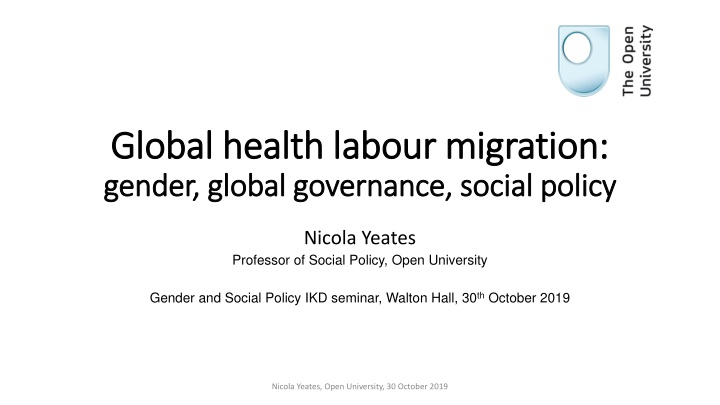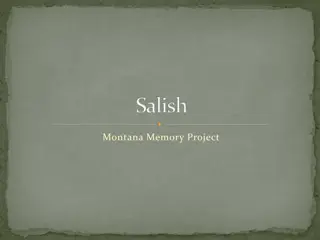
Global Dynamics of IHWMR Policy and Governance
Explore the global dynamics of health labor migration and gender in social policy governance, as discussed by Professor Nicola Yeates from Open University. Follow the development of the IHWMR field, its key challenges, bilateral agreements, and the path towards transformative action. Dive into the role of global institutions, actors, and norms, analyzing how cross-border governance influences IHWMR policy approaches. Gain insights into the significance of a workforce in maintaining global health and social welfare, anticipating future priorities aligned with the SDGs.
Download Presentation

Please find below an Image/Link to download the presentation.
The content on the website is provided AS IS for your information and personal use only. It may not be sold, licensed, or shared on other websites without obtaining consent from the author. If you encounter any issues during the download, it is possible that the publisher has removed the file from their server.
You are allowed to download the files provided on this website for personal or commercial use, subject to the condition that they are used lawfully. All files are the property of their respective owners.
The content on the website is provided AS IS for your information and personal use only. It may not be sold, licensed, or shared on other websites without obtaining consent from the author.
E N D
Presentation Transcript
Global health labour migration: Global health labour migration: gender, global governance, social policy gender, global governance, social policy Nicola Yeates Professor of Social Policy, Open University Gender and Social Policy IKD seminar, Walton Hall, 30thOctober 2019 Nicola Yeates, Open University, 30 October 2019
No health without a workforce Nicola Yeates, Open University, 30 October 2019
What about global social governance and policy? Nicola Yeates, Open University, 30 October 2019
Scope and questions of the book Scope and questions of the book Initiation and development of IHWMR as a global social policy field over 70 years (to 2018): - Global institutions, actors, norms, policies, programmes; - How IHWMR is taken up as a global policy issue and responded to, and the material, ideational, normative drivers of this; includes extended analysis of bilateral agreements; - Looking ahead: key issues and priorities for global policy viz. SDGs How and why have cross-border spheres of governance become such important sites of action on IHWMR? What policy approaches are evident in the field, and as instituted in global initiatives? What are the implications of the evidence and analysis? Theoretically, in relation to welfare state and social policy change? And for creative opportunities viz. transformative action? Nicola Yeates, Open University, 30 October 2019
Overview of the book Overview of the book Ch. 1: The global dynamics of IHWMR policy Ch. 2 Initiating the global policy field: role of the UN Ch. 3: Elaborating the global policy field: 1977 ILO Nursing Personnel Recommendation Ch 4: The rise of ethical recruitment: momentum without enforcement Ch. 5: Implementing WHO Global Code of Practice: momentum sustained? Ch. 6: Bilateral agreements: a resurgent feature of global policy Ch. 7: The global campaign for universal health coverage: SDGs and beyond Ch. 8: Conclusion towards a new world order for health Nicola Yeates, Open University, 30 October 2019
About the IHWMR case About the IHWMR case Earliest case of a global social policy field of care and migration. Development of the field is best understood through multiple global regimes - health, migration, social protection, labour, trade, equality, human rights, development and intersections among them. An overtly institutionalised field: 2 dedicated multilateral agreements and several flanking ones; multiple global and sub-global initiatives underway, further ones in train. Multiple transnational actors, diverse international governmental and non- governmental organisations. A dynamic, busy field, viz global institutions, actors, norms, policy approaches, programmes, initiatives - and a highly contested one; critical junctures. Nicola Yeates, Open University, 30 October 2019
Key concepts Brain drain, reverse transfers of technology, fair recruitment Landmark agreements ILO general labour standards from 1946 (also pre-UN during LoN era); Universal Declaration on Human Rights 1948; International Covenant on Civil and Political Rights 1966; International Covenant on Economic, Social and Cultural Rights 1966; ILO Nursing Personnel Recommendation 1977 1. Initiating and defining the global policy field health sector reforms, ethical recruitment, temporary/circular migration, decent work General Agreement on Trade in Services 1995; MDGs 2000; Various ethical codes from 2000, leading to WHO Global Code of Practice on the Ethical Recruitment of Health Personnel 2010; (Social Protection Floor 2012) 2. The rise of ethical initiatives ethical recruitment, universal health coverage, health jobs- rich growth, fair recruitment, decent work, sustainability, multistakeholderism, human rights due- diligence, temporary and circular migration SDGs 2015/16; Global Compact on Migration 2018 [international legally binding instrument - Transnational Corporations and Other Business Enterprises re human rights. 3. Mainstreaming IHWMR into global health and development Decennial review of 2010 WHO Global Code. Global Skills Partnerships Nicola Yeates, Open University, 30 October 2019
Gendered health inequity: gender inequality over the lifecourse undermines global health outcomes Demographic changes and rising demands for health care are projected to drive the creation of 40 million jobs by 2030 in the global health and social sector. In parallel, there is an estimated shortfall of 18 million health workers, primarily in low- and middle-income countries, required to achieve the SDGs and universal health coverage. The global mismatch between health worker supply and demand is both a cause for concern and a potential opportunity [but] gaps in health worker supply will not be closed without addressing the gender dynamics of the health and social workforce. (WHO 2019, Delivered by Women, Led by Men) Gendered workforce: 70% of the health and social care workforce are women, 25% of women in this workforce occupy senior roles Gendered migration: female nurses are the dominant migrant health worker group; across the migration process, vulnerability to exploitation Nicola Yeates, Open University, 30 October 2019
Gendering global governance, politics, policy Gendering global governance, politics, policy Early focus on brain drain gives way to feminisation of the policy field in 1970s Limited systematic appreciation of gendered HWM in global policy E.g. gender inequalities replicated through migration process, neglected in human resources for health planning, multiple discriminations (as women, minority ethnic, migrant) Belated impetus from SDGs: gender equality, health and well-being, decent work Acknowledgement of gender dividend of SDGs in social and health care workforce, but discourse focuses on increasing women s LF and educational participation in attaining UHC Opportunities for transformative social policy to address global health and social inequalities remain to be fully seized including how gender/intersectionality in health worker migration can be incorporated into global policy. Nicola Yeates, Open University, 30 October 2019
Strengthening global governance of International Strengthening global governance of International health worker migration and recruitment health worker migration and recruitment Are new instruments needed or better implementation of existing ones? What about institutional strengthening? What approaches? From aid / charity to self-sufficiency? And how? Financial restitution Inclusive multi-level, multi-stakeholder partnerships Ending dependence on overseas health workers to staff health services Shared responsibility rooted in the values and practices of equality, global social justice and social sustainability Beyond health: forging lateral connections across multiple social and economic policy sectors Dialogue with the care economy and investment in social infrastructure Nicola Yeates, Open University, 30 October 2019







